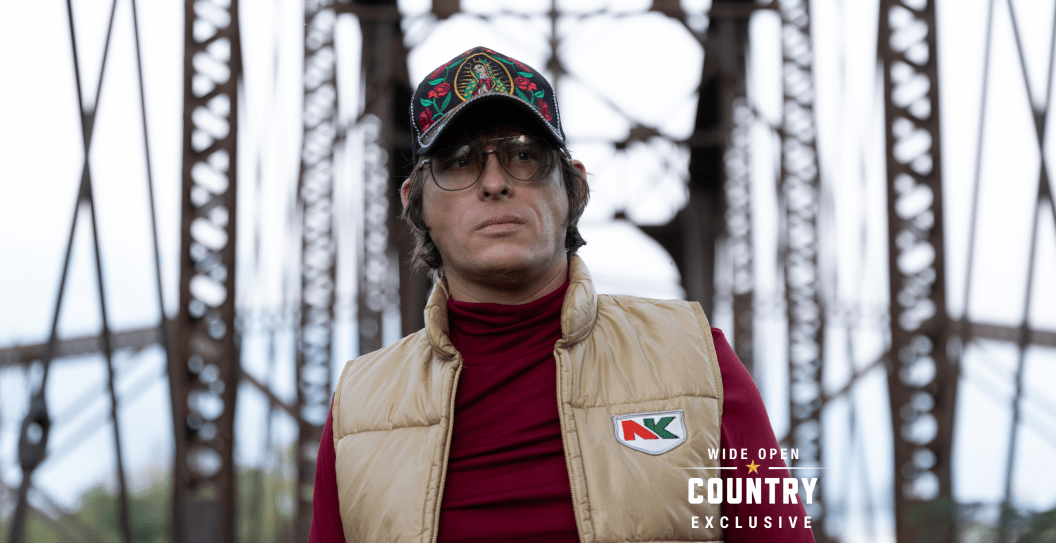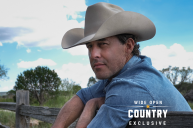Before Stephen Wilson Jr. was a musician, he was a boxer. He was a regular in the gyms and clubs in Seymour, Indiana (also the hometown of John Mellencamp) growing up in the shadow of his father Stephen Wilson Jr., a boxer and auto body repair man he described as "a hillbilly that was enamored with Muhammad Ali."
Despite not being as skilled a boxer as his father or brother Nicholas, Wilson Jr. credits the battleground for being where he cut his teeth as a performer.
"My first stage wasn't really a stage at all, it was a boxing ring," Wilson Jr. tells Wide Open Country. "I was super shy as a kid, so that was where I learned to work a crowd. Even my dad would talk about putting on a show more than putting on a fight. It was my first arena of entertainment."
More lessons and wisdom from Wilson Jr.'s father permeate throughout the 22-song double album Søn Of Dad. On it he documents his origin story from needing to escape his father's shadow to coming around to embrace him and all they share in common in the wake of his unexpected death in 2018, delivering a one-two knockout punch of love and grief in the process.
At the heart of that journey is the song "Father's Son," an acknowledgment Wilson Jr. will always have a part of his father in and with him no matter where he goes or what he does. On it he documents the full scope of this journey, going from leaving town "just to get out of his shadow" to wearing his blue jean jacket with his name on it like a badge of honor because "I used to hate being called Junior, but I don't mind any longer." It's a dynamic he, of course, likens to boxing.
"When you watch it you'll see a lot of Juniors," says Wilson Jr. "There's a lot of weight in that suffix. Every Junior I see fighting typically has the Senior, oftentimes their father, in the corner. But even though it's the Junior in the ring, it's not just him fighting. When I see Floyd Mayweather Jr. fight I also see his father because Floyd Jr. is carrying his father's legacy with him. That same mindset is how I approached making this record, because back home I was Junior or Stephen's boy. I never had my own name, so I was quick to run away to try to make one."
Regardless of their perceived differences, Wilson Jr. always had his father's support. He was the first in his family to attend college, going on to graduate from Middle Tennessee State University with degrees in microbiology and chemistry before going on to work in a lab at Mars [food company]. He was also part of the indie rock band AutoVaughn that helped to propel him into Nashville writing rooms. This led to him shifting focus from a career in the lab to a career in music, one he'd officially embark on in 2016 by signing a publishing deal with BMG Nashville.
"All I could think about was writing songs, even while I was working in labs for Mars," says Wilson Jr. "So I left that job and took the plunge, throwing myself into the [musical] boxing ring, a place where my father was always my biggest champion. He was always in my corner pumping me up, which helped me a lot in navigating the waters of rejection in Nashville."
While a handful of songs on Søn Of Dad were written shortly after signing the BMG deal (like "Not Letting Go", "Year To Be Young 1994" and "the devil"), Wilson Jr. says most of the project's compositions came about in the wake of his father's passing. After being blindsided by the news and having to say his final goodbye over the phone, Wilson Jr. was left in shambles as he looked to collect himself and move forward without his biggest fan and confidant. That grief and uncertainty hits the listener like a punch to the gut on songs like "Werewolf," "Mighty Beast" and "Cuckoo," all of which were written in the near aftermath and fully entrenched in the grieving process.
"It's a wild moment, which is exactly why I wanted those songs on there," says Wilson Jr. "My mind is so frantic in them, almost like being in the eye of a hurricane. I was in a state of complete hysteria, and those songs mirror that. That's what I wanted this all to be, a record of the past five years, both good and bad."
Centerpieces of that anguish are "Grief Is Only Love" and "patches," tunes Wilson Jr. penned with Jeffrey Steele as the two were coping with their own losses, Wilson Jr. with his father and Steele with his 13-year-old son. With "patches," Wilson Jr. says the song grew out of a conversation between he and Steele after writing "Grief Is Only Love" about living scarred lives leading to Wilson Jr. describing his as patches on his skin and having so many that even "my patches got patches," which became a hook in the song.
"The song is one of the most autobiographical for me on the record," says Wilson. "It felt like the most 'me' song that I have and one that my dad would have loved. For that reason I made it chipper and bouncy on purpose because I could see him whistling, singing and dancing around to it."
The further you get into Søn Of Dad the more that bounciness is reflected not only in the musical arrangements, but the album's lyrical content as well. On songs like "twisted", "American Gothic" (featuring reigning ACM New Female Artist of the Year Hailey Whitters), "All The Wars From Now On" and "Kid" you can see and hear Wilson Jr. beginning to work through the healing process with his pent up trauma, anguish and grief.
Losing a loved one is a life-altering event that breaks a lot of people, but not Wilson Jr. Even though he's no longer in the boxing ring, he's using the fighter's mentality bestowed on him by his father to find success with his music and in the much larger ring of life. It's a lesson in healing and overcoming adversity that we could all use a bit of, plus it makes one helluva soundtrack.
"Music has taught me that I'm braver than I thought I was," says Wilson Jr. "It's thrown me into arenas that I never would've walked into without it. It's made me brave and been like a sword that I've taken into battles I didn't belong in yet. It's also an incredibly powerful unifying tool that literally has the ability to change the world. I've gotten so many messages about dark songs like 'the devil' and how they've brought people out of suicidal or depressive episodes, which has been quite remarkable to witness."




